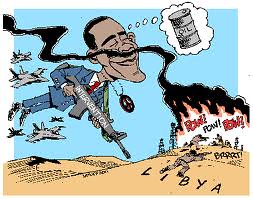
The U.S. imperialists attacked the North African state of Libya in order to seize the oil-rich country and establish a military beachhead inside the region. Thousands have died in the imperialist war., a photo by Pan-African News Wire File Photos on Flickr.
Libya’s Waha Oil Output Cut by 120,000 Barrels a Day, Arusi Says
By Saleh Sarrar and Ola Galal
Mar 18, 2013
Waha Oil Co.’s pipeline in Libya was shut because of a strike at its Gialo field resulting in a cut in the country’s crude output by 120,000 barrels a day, Oil Minister Abdulbari al-Arusi said.
The protest is continuing today at the Gialo field, which feeds crude into a pipeline that runs to the Es Sider export terminal, Abduljalil Mayuf, spokesman of Arabian Gulf Oil Co., a unit of National Oil Corp., said by phone from the eastern city of Benghazi.
Nuri Berruien, chairman of state-run NOC, which owns Waha Oil in partnership with ConocoPhillips, Hess Corp. and Marathon Oil Corp., couldn’t be reached on his mobile phone for comment.
Libya, holder of Africa’s largest crude reserves, is struggling to contain strikes and sporadic armed clashes as it strives to increase oil output and attract foreign investors in the aftermath of the uprising that ousted Muammar Gaddafi and put the country in political turmoil.
Truck drivers who transport jet fuel to Benina Airport in the eastern city of Benghazi are also on a walkout, forcing the government to bring product from the capital Tripoli at a higher cost to ensure the operations of flights at the facility, al- Arusi told reporters yesterday.
“At the end, we are able to use force if these strikes continue to impact important facilities,” al-Arusi said. “These impact the lives of citizens and Libya’s relationship with foreign companies.”
Prime Minister Ali Zaidan said that halting oil production is a “crime punishable by law,” according to Libya’s official news agency LANA.
Libya’s crude output rose to 1.38 million barrels a day in January, according to the International Energy Agency, and the Oil Ministry plans to boost supply to as much as 2 million barrels by the end of 2015.
To contact the reporters on this story: Saleh Sarrar in Dubai at ssarar@bloomberg.net; Ola Galal in Cairo at ogalal@bloomberg.net
To contact the editor responsible for this story: Raj Rajendran at rrajendran4@bloomberg.net
No comments:
Post a Comment